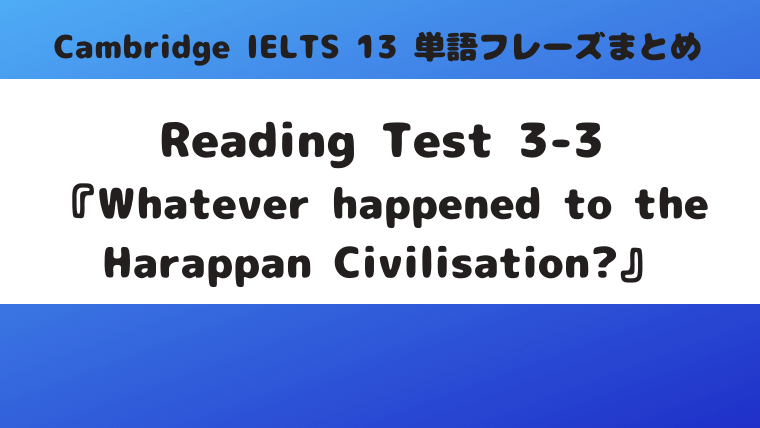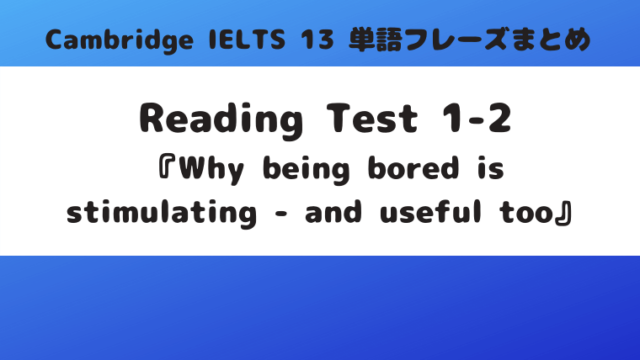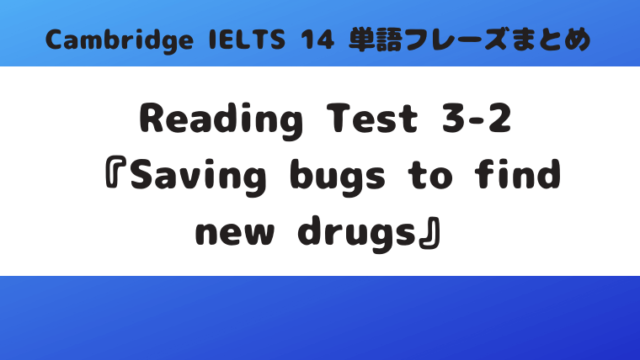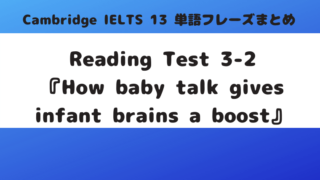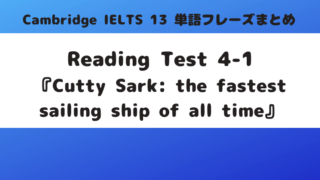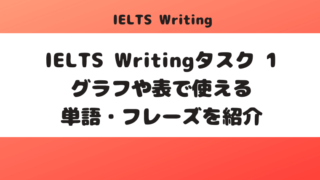「Cambridge IELTS 13」Reading Test3-3『Whatever happened to the Harappan Civilisation?』の単語・フレーズをまとめました。
私がIELTS Readingの単語・まとめを行う理由は「Cambridge IELTS Reading単語・フレーズまとめ」からご覧ください。
Reading Test 3 Passage 3:Whatever happened to the Harappan Civilisation?
- sheds light on
… に光を当てる;… が解明される - disappearance
noun [ C or U ]
UK /ˌdɪs.əˈpɪə.rəns/ US /ˌdɪs.əˈpɪr.əns/
the fact of someone or something disappearing:
1 失踪(しっそう)
2 the disappearance of something
<…>の消滅
(実践IELTS英単語3500:899) - flourish
verb
UK /ˈflʌr.ɪʃ/ US /ˈflɝː.ɪʃ/
to grow or develop successfully:
to move something in your hand in order to make people look at it:
1 《自》 <商売・事業などが> 繁盛する, <芸術・思想などが> 栄える
同意 thrive
2 《自》 <動植物が> よく育つ
同意 thrive
3 《他》 …を見せびらかす, 自慢する
(実践IELTS英単語3500:1320) - abandoned
adjective
UK /əˈbæn.dənd/ US /əˈbæn.dənd/
left in a particular place or condition, usually forever:
<車・建物・動物などが> 捨てられた, 放棄された - depiction
noun [ C or U ]
UK /dɪˈpɪk.ʃən/ US /dɪˈpɪk.ʃən/
the way that something is represented or shown:
(著作・絵画などで) …を表現する, 描く, 描写する - imagery
noun [ U ]
UK /ˈɪm.ɪ.dʒər.i/ US /ˈɪm.ə.dʒər.i/
the use of words or pictures in books, films, paintings, etc. to describe ideas or situations:
1 (画像などの) イメージ喚起(の力), 表現力
2 (文学における) 修辞[比喩]的表現, 形象
3 一連の画像[映像]
(実践IELTS英単語3500:2192) - archaeological
adjective (US also archeological)
UK /ˌɑː.ki.əˈlɒdʒ.ɪ.kəl/ US /ˌɑːr.ki.əˈlɑː.dʒɪ.kəl/
involving or relating to archaeology:
考古学(上)の - lay out [句動詞]
1 lay something ↔ out <…>を(きちんと)並べる
2 lay something ↔ out 《通例受け身形で》 (設計・計画などに基づいて) <…>をレイアウトする, 配列する
3 lay something ↔ out (正式に) <…>を公表[説明]する, 明らかにする
同意 set out
4 lay out something 〘インフォーマル〙 <(多額の)金>を使う, 出す
同意 fork out, shell out→ outlay
5 lay somebody ↔ out 《通例受け身形で》 <人>を殴り倒す, 殴って気絶させる
同意 knock out
6 lay somebody/something ↔ out 《通例受け身形で》 〘フォーマル〙 <死体>を埋葬準備する
7 lay out 米 〘非標準〙 日光浴をする
同意 sunbathe - alleyway
路地, 裏通り 同意 alley - drainage
noun [ U ]
UK /ˈdreɪ.nɪdʒ/ US /ˈdreɪ.nɪdʒ/
the system of water or waste liquids flowing away from somewhere into the ground or down pipes:
the ability of soil to allow water to flow away:
1 排水[下水]設備
2 排水(すること), 水はけ
3 排水, 廃液 - demise
noun [ S ] formal
UK /dɪˈmaɪz/ US /dɪˈmaɪz/
sb’s demise
the death of a person
the end of something that was previously considered to be powerful, such as a business, industry, or system:
1 〘フォーマル〙 消滅, 終焉(しゅうえん)
2 〘フォーマル/法〙 死亡, 死去, 逝去
somebody’s untimely demise
<人>の早すぎる死 - millennium
noun [ C ]
UK /mɪˈlen.i.əm/ US /mɪˈlen.i.əm/
a period of 1,000 years, or the time when a period of 1,000 years ends
1 《C》 1,000年間
2 《常に単数形で》 新千年紀(の始まり)
3 the millennium (キリスト教での) 至福千年, 千年王国 ((イエス・キリストが再臨してこの世を統治する千年間))
4 《常に単数形で》 (将来やってくると期待される) 幸福な時代 - glacier-fed rivers
氷河が溶けてできた川 - succumb
verb [ I ] formal
UK /səˈkʌm/ US /səˈkʌm/
to lose the determination to oppose something; to accept defeat:
to die or suffer badly from an illness:
1 屈服する
同意 give in
2 (病気で) 倒れる, 死ぬ
(実践IELTS英単語3500:3139) - invasion
noun [ C or U ]
UK /ɪnˈveɪ.ʒən/ US /ɪnˈveɪ.ʒən/
an occasion when an army or country uses force to enter and take control of another country:
an occasion when a large number of people or things come to a place in an annoying and unwanted way:
an action or process that affects someone’s life in an unpleasant and unwanted way:
1 《C, U》 侵略, 侵攻
2 《C》 殺到
(実践IELTS英単語3500:1102) - speculation
noun [ C or U ]
UK /ˌspek.jəˈleɪ.ʃən/ US /ˌspek.jəˈleɪ.ʃən/
the activity of guessing possible answers to a question without having enough information to be certain:
the act of speculating in order to make a profit
1 憶測, 推量
2 投機 - carry out
1 <…>を行う, 実施する
2 <約束など>を果たす, <命令・指示など>を実行[遂行]する - inaccuracy
noun [ C or U ]
UK /ɪnˈæk.jə.rə.si/ US /ɪnˈæk.jɚ.ə.si/
a situation in which a fact or measurement is not completely correct or exact:
1 《C》 (文書・計算などの) 誤り
2 《U》 不正確さ - flaw
noun [ C ]
UK /flɔː/ US /flɑː/
a fault, mistake, or weakness, especially one that happens while something is being planned or made, or that causes something not to be perfect:
1 (生地・食器などの) 傷, ひび, (設計・機械などの) 欠陥
同意 defect
2 (議論・計画・考えなどの) 欠点, 欠陥, ほころび
3 (性格上の) 欠点, 短所
(実践IELTS英単語3500:2816) - fieldwork
noun [ U ]
UK /ˈfiːld.wɜːk/ US /ˈfiːld.wɝːk/
study that consists of practical activities that are done away from your school, college, or place of work:
1 フィールドワーク, 実地研究, 野外調査
2 畑仕事, 農作業 - astonishing
adjective
UK /əˈstɒn.ɪ.ʃɪŋ/ US /əˈstɑː.nɪ.ʃɪŋ/
very surprising:
驚くべき, すごい
(実践IELTS英単語3500:1999) - definitive
adjective
UK /dɪˈfɪn.ɪ.tɪv/ US /dɪˈfɪn.ə.t̬ɪv/
・not able to be changed or improved:
・considered to be the best of its type:
1 the definitive study / work / guide
最も信頼できる研究[仕事,入門書]
2 <合意・回答などが> 最終的な, 決定的な
(実践IELTS英単語3500:2633) - sediment
noun
UK /ˈsed.ɪ.mənt/ US /ˈsed.ə.mənt/
a soft substance that is like a wet powder and consists of very small pieces of a solid material that have fallen to the bottom of a liquid:
(川底・海底などの) 堆積(たいせき) 物, (ワインなどの) おり
(実践IELTS英単語3500:3025) - monsoon
noun [ C ]
UK /mɒnˈsuːn/ US /mɑːnˈsuːn/
the season of heavy rain during the summer in hot Asian countries:
1 《C通例単数形で》 (monsoon season とも) (南アジアの) 雨季 ((4月から10月ころまで)) monsoon rain
雨季の雨
2 《C》 豪雨
3 《C》 (monsoon wind とも) 季節風, モンスーン - abrupt
adjective
UK /əˈbrʌpt/ US /əˈbrʌpt/
・sudden and unexpected, and often unpleasant:
・using too few words when talking, in a way that seems rude and unfriendly:
1 突然の, 唐突な
2 <態度・言葉などが> ぶっきらぼうな, つっけんどんな
(実践IELTS英単語3500:1832) - evaporation
noun [ U ]
UK /ɪˌvæp.əˈreɪ.ʃən/ US /ɪˌvæp.əˈreɪ.ʃən/
・the process of a liquid changing to a gas, especially by heating:
・the fact of something disappearing:
1 (液体の) 蒸発
2 (希望などの) 消滅 - cultivate
verb [ T ]
UK /ˈkʌl.tɪ.veɪt/ US /ˈkʌl.tə.veɪt/
・to prepare land and grow crops on it, or to grow a particular crop:
・to try to develop and improve something:
1 <土地・畑など> を耕す, 耕作する, 開墾する
同意 farm
2 <作物> を栽培する
3 <技能・特性など> を磨く, 伸ばす, <イメージなど> を高める, <人> を育成する
4 <友好・関係など> を深める(努力をする)
(実践IELTS英単語3500:1923) - pottery
noun [ U ]
UK /ˈpɒt.ər.i/ US /ˈpɑː.t̬ɚ.i/
the activity or skill of making clay objects by hand
objects that are made out of clay by hand:
1 《U》 陶器
2 《U》 製陶, 陶器作り
3 《C》 製陶所
(実践IELTS英単語3500:2108) - proactive
adjective
UK /ˌprəʊˈæk.tɪv/ US /ˌproʊˈæk.tɪv/
taking action by causing change and not only reacting to change when it happens:
積極的な, 先を読んで行動を起こす 反意 reactive
